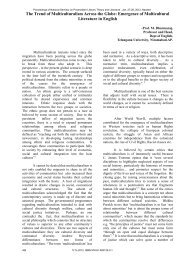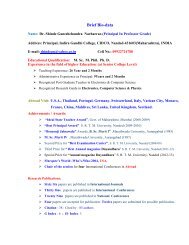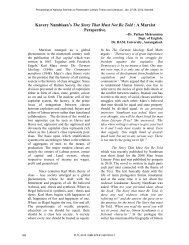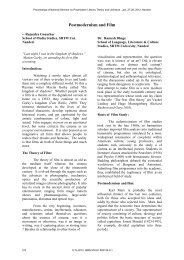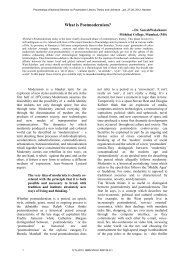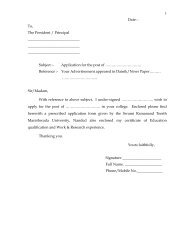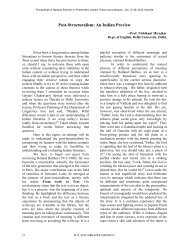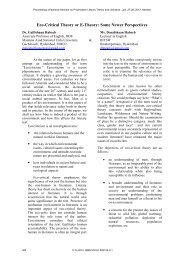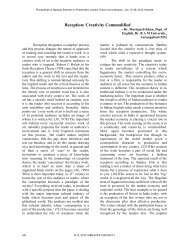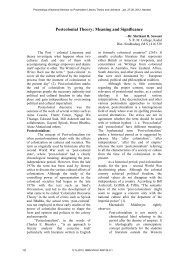Postcolonial Feminist Theory: An Overview - Igcollege.org
Postcolonial Feminist Theory: An Overview - Igcollege.org
Postcolonial Feminist Theory: An Overview - Igcollege.org
You also want an ePaper? Increase the reach of your titles
YUMPU automatically turns print PDFs into web optimized ePapers that Google loves.
Proceedings of National Seminar on Postmodern Literary <strong>Theory</strong> and Literature , Jan. 27-28, 2012, NandedThe Role of Women in <strong>Postcolonial</strong> LiteratureMr. Sachin L. Patki & Mr. Suyog S. DodalAssist. Professor in EnglishAdarsh Education Society’s ACS College,Hingoli.The influence of women has shaped and modelled nearly every society existing withinthe planet earth, whether their stature is moderate, subservient or prevalent. The femalepersuasion is an underlying current society, a community within a community, a species of itsown. The distinct differences between men and women create a figurative rift or subcategoryin each and every aspect of being. There may be black or white, gentile or Jew, master orservant, but within each of these lies as aspect which truly defines the individual – feminism.In <strong>Postcolonial</strong> literature, one might see the opposing forces as being the colonizer and thecolonized, but within each lays the innate qualities of distinct gender, making each subculturenot a unified front, but a multi-faceted and radical society. J.M.Coetzee’s Magda in “In theHeart of the Country” and Arundhati Roy’s Rahel in “The God of Small Things” help toestablish the ever-changing role of a Colonized women in African and Indian <strong>Postcolonial</strong>literature.The roles of women in literature are often quite wide in spectrum. Women are oftenportrayed as secondary characters to the greater men who carry the story line along, while thefemales are simply offer a supporting role in the midst of the action. However, in theturbulent times of colonization, a great and powerful woman has arisen, rather a form offeminine strength that has risen from the ashes of pitiful literary damsels. The two fictionalwomen representing South Africa and India in the aforementioned literary works areremarkable and incredibly strong willed. A sense of self and reason has perpetuated theactions of these women and while merely fictional help to represent the new birth of a culturevia oppression.Magda, an unnerving self-proclaimed spinster and the protagonist of J.M.Coetzee’sSouth African novel “In the Heart of the Country” is an independent, though excruciatinglydisturbed young Caucasian women who acts as the novel’s unreliable narrator. BecauseMagda is perpetually insane, her thoughts and notions are succinct, scoffing at the fact thather father brings home mistress after mistress. There is an air incest, an unnerving notion thatMagda and her father have participated in a sort of twisted sexual relationship and thisparticular situation is the jumping-off point for Magda’s insanity. Because she feels as thoughshe is not pretty enough to compete with her father’s suitors, she exercises her womanlyconcerns, which ultimately lead to her downfall.Magda’s inherent femininity drives her down a deep spiral that results in anuncompromising end. If her gender were to be different, the novel would immediately lose ofall its relevance, as the fact that her sex has set her aside from her own flesh and bloodbecomes the driving force of her latent inhibitions. After fantasizing that she murders notonly her father, but his new wife as well, Magda begins to live in a world that she creates,manipulating those within it via her sexuality and feminine mystique. She attempts to seducethe lowly servant Hendrick because she secretly feels as though his lover, Klein <strong>An</strong>na, ismore beautiful than she is. Herein lies the subtle distinctions of postcolonial existence;Magda is white while <strong>An</strong>na black, but her color does not hinder <strong>An</strong>na from becoming asexual object. While Magda already feels outnumbered by the black inhabitants of SouthAmerica and is considered an outsider, she is further secluded due to her gender, and even371 PLTL-2012: ISBN 978-81-920120-0-1



